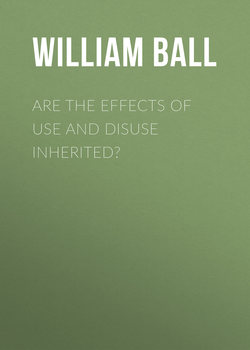Читать книгу Are the Effects of Use and Disuse Inherited? - Ball William Platt - Страница 2
IMPORTANCE AND BEARING OF THE INQUIRY
ОглавлениеThe question whether the effects of use and disuse are inherited, or, in other words, whether acquired characters are hereditary, is of considerable interest to the general student of evolution; but it is, or should be, a matter of far deeper interest to the thoughtful philanthropist who desires to ensure the permanent welfare and happiness of the human race. So profoundly important, in fact, are the moral, social, and political conclusions that depend on the answer to this inquiry, that, as Mr. Herbert Spencer rightly says, it "demands, beyond all other questions whatsoever, the attention of scientific men."
It is obvious that we can produce important changes in the individual. We can, for example, improve his muscles by athletics, and his brain by education. The use of organs enlarges and strengthens them; the disuse of parts or faculties weakens them. And so great is the power of habit that it is proverbially spoken of as "second nature." It is thus certain that we can modify the individual. We can strengthen (or weaken) his body; we can improve (or deteriorate) his intellect, his habits, his morals. But there remains the still more important question which we are about to consider. Will such modifications be inherited by the offspring of the modified individual? Does individual improvement transmit itself to descendants independently of personal teaching and example? Have artificially produced changes of structure or habit any inherent tendency to become congenitally transmissible and to be converted in time into fixed traits of constitution or character? Can the philanthropist rely on such a tendency as a hopeful factor in the evolution of mankind? – the only sound and stable basis of a higher and happier state of things being, as he knows or ought to know, the innate and constitutionally-fixed improvement of the race as a whole. If acquired modifications are impressed on the offspring and on the race, the systematic moral training of individuals will in time produce a constitutionally moral race, and we may hope to improve mankind even in defiance of the unnatural selection by which a spurious but highly popular philanthropy would systematically favour the survival of the unfittest and the rapid multiplication of the worst. But if acquired modifications do not tend to be transmitted, if the use or disuse of organs or faculties does not similarly affect posterity by inheritance, then it is evident that no innate improvement in the race can take place without the aid of natural or artificial selection.
Herbert Spencer maintains that the effects of use and disuse are inherited in kind, and in his Factors of Organic Evolution1 he has supported his contention with a selection of facts and reasonings which I shall have the temerity to examine and criticize. Darwin also held the same view, though not so strongly. And here, to prevent misunderstanding, I may say that the admiration and reverence and gratitude due to Darwin ought not to be allowed to interfere in the slightest degree with the freest criticism of his conclusions. To perfect his work by the correction of really extraneous errors is as much a sacred duty as to study and apply the great truths he has taught.
1
Which originally appeared in the Nineteenth Century for April and May, 1886.
